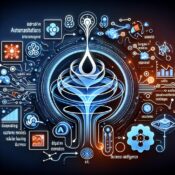Artificial Intelligence (AI) continues to be a transformative force across multiple sectors, from healthcare and finance to automotive and entertainment. The latest advancements highlight the increasing capabilities of AI systems, including enhanced machine learning algorithms, improved natural language processing (NLP), and more sophisticated robotic automation.
One significant trend is the evolution of neural networks and deep learning techniques. Researchers are working on creating AI models that can learn from smaller data sets, dramatically increasing efficiency and reducing computational costs. This advancement is crucial for fields like medical diagnostics, where obtaining large datasets can be challenging.
AI’s role in improving NLP has led to the development of more intuitive and interactive virtual assistants and chatbots. These systems are now better at understanding context and nuances in human language, providing more accurate and relevant responses.
Moreover, AI’s integration into robotics is making strides in both industrial applications and personal use. Improved algorithms are enabling robots to perform more complex tasks with higher precision, which is particularly beneficial in manufacturing and logistics.
Ethical considerations and the importance of creating transparent, accountable AI systems are also major points of discussion. As AI continues to evolve, ensuring these systems are designed with ethical guidelines in mind is paramount to prevent misuse and ensure trustworthiness.
In conclusion, AI is rapidly advancing and becoming more integrated into everyday life, offering unprecedented opportunities for innovation and efficiency. However, balancing these advancements with ethical considerations remains a critical challenge.
—
Artificial Intelligence: Revolutionizing Industries and Everyday Life
The landscape of Artificial Intelligence (AI) is rapidly evolving, bringing transformative changes across various sectors. From healthcare to finance, the advancements in AI are not just promising, but they are actively reshaping how industries operate and how we interact with technology daily.
### Cutting-Edge Neural Networks and Deep Learning
One of the most significant breakthroughs in AI is in the development of neural networks and deep learning techniques. Researchers are making strides in creating AI models that require smaller datasets to learn effectively. This is a game-changer, particularly in fields like medical diagnostics, where large datasets are scarce. These advancements mean more efficient systems that can deliver accurate results with less computational power.
### Enhanced Natural Language Processing
Another area where AI is making substantial progress is in Natural Language Processing (NLP). The development of more intuitive and interactive virtual assistants and chatbots is a direct result of improved NLP capabilities. These systems are now better equipped to understand the context and nuances of human language, resulting in more accurate and relevant responses. This makes them invaluable tools in customer service, content generation, and even mental health support.
### Sophisticated Robotic Automation
AI’s integration into robotics is revolutionizing both industrial applications and personal use. Enhanced algorithms are enabling robots to perform increasingly complex tasks with higher precision. In manufacturing and logistics, this means more efficient operations and reduced human error. For personal use, it translates to smarter home assistants and more capable personal care robots.
### Ethical Considerations and AI Accountability
As AI technology advances, the importance of ethical considerations and accountability cannot be overstated. Ensuring that AI systems are transparent and designed with ethical guidelines is crucial to prevent misuse and build public trust. This involves creating frameworks for accountability and ensuring that AI systems are free from biases that could lead to unfair outcomes.
### The Future of AI
The future of AI is incredibly promising, with potential applications that could revolutionize every aspect of our lives. From smarter healthcare solutions to more efficient business operations, AI offers unprecedented opportunities for innovation. However, as we embrace these advancements, it is essential to balance them with ethical considerations to ensure a future where AI benefits all of humanity.
In summary, AI is not just a buzzword but a powerful tool that is actively shaping the future. By staying informed about the latest developments and ethical considerations, we can harness the full potential of AI to create a better, more efficient world.
source: https://www.sciencedaily.com/news/computers_math/artificial_intelligence/
Keywords: neural networks, NLP, robotics




Recent Comments